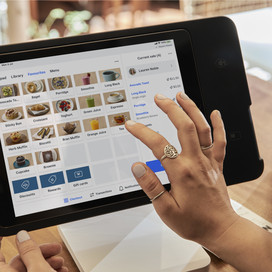Table of contents
Pasta Prego have big ambitions. Seeing the gap in the market for quality, takeaway pasta in Melbourne, the Isaac and Lorenzo have created a concept that Prahran loves. It’s a winning formula for one store, but the team are looking to expand and are thinking about a prep kitchen that could set them up for more venues in the future.
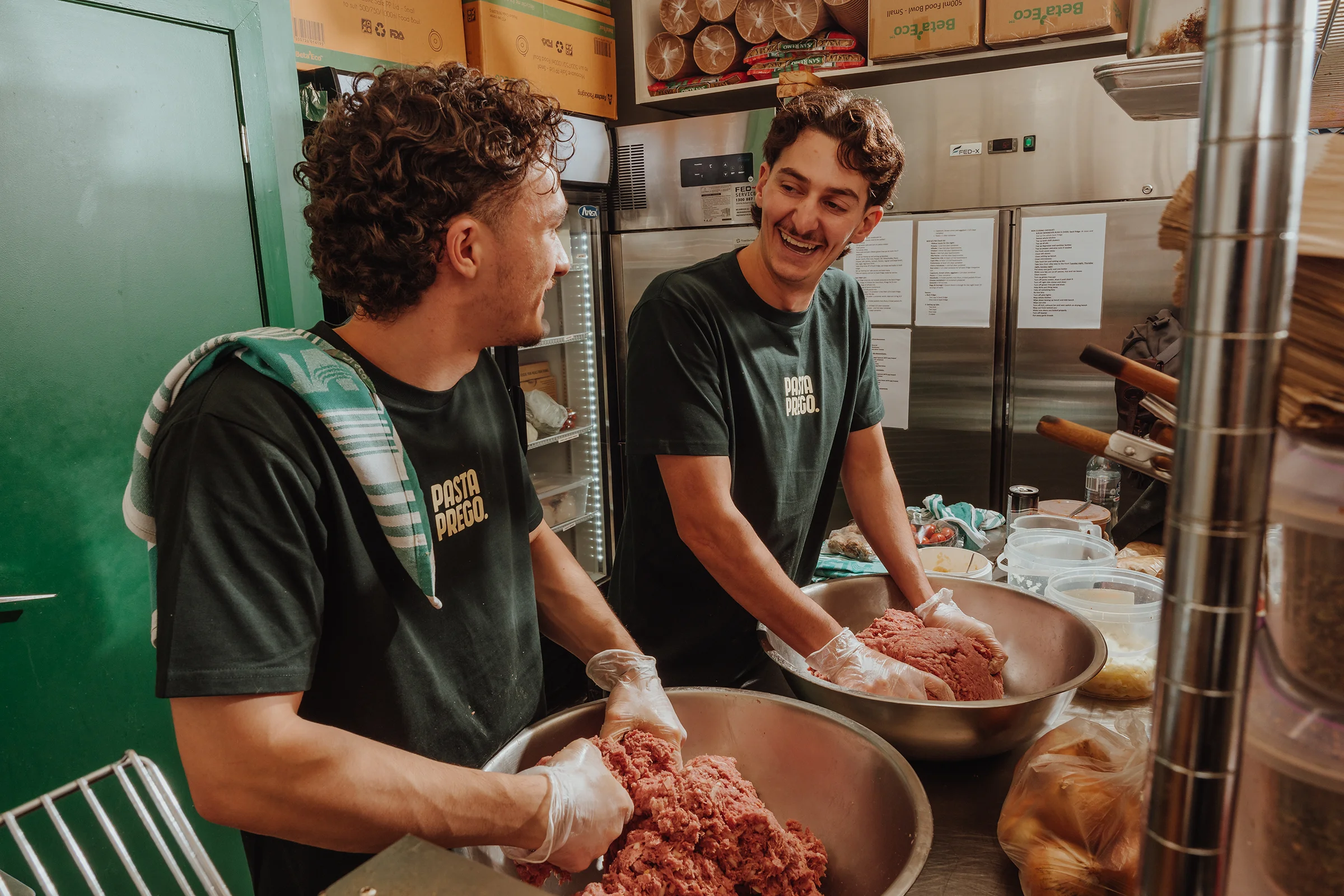
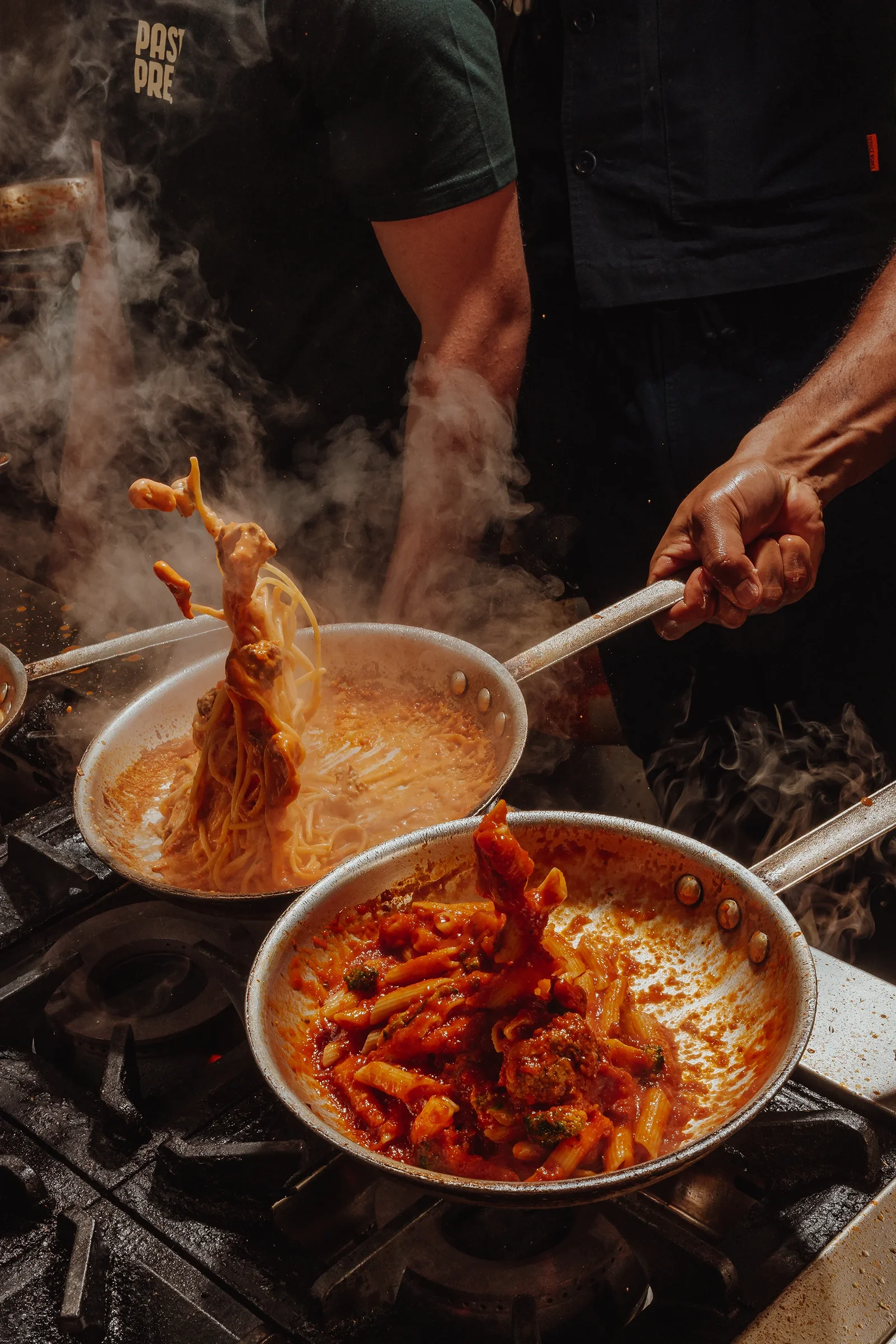
Thankfully, Benji from Kosta’s Takeaway has been there and done that, now with four stores under his belt including one HQ with a prep kitchen. Together with our host Melissa Leong, the group discuss expanding and how to approach a prep kitchen.
Pasta Prego uses
Kosta’s Takeaway uses
Subscribe to Coolroom Confessional
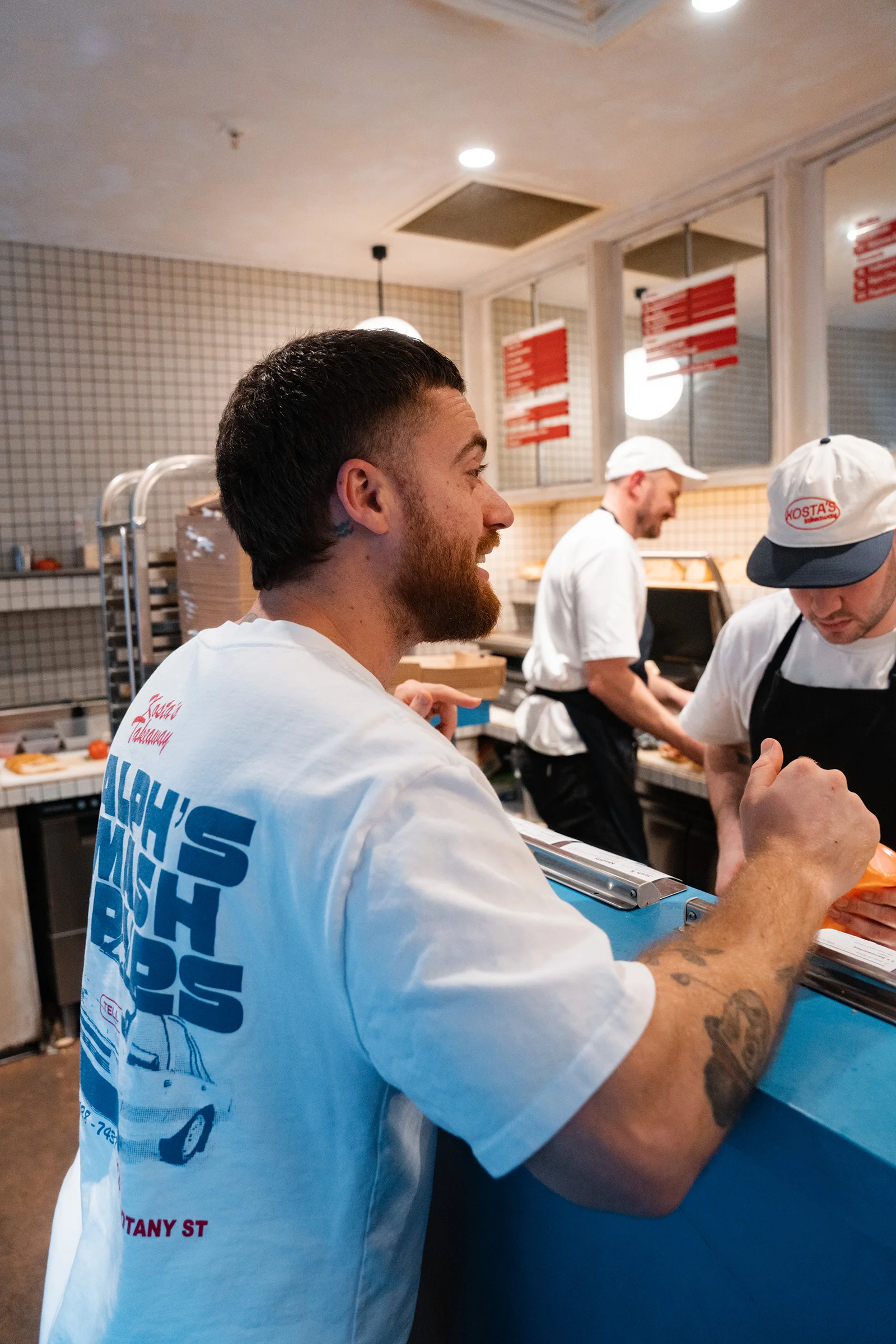
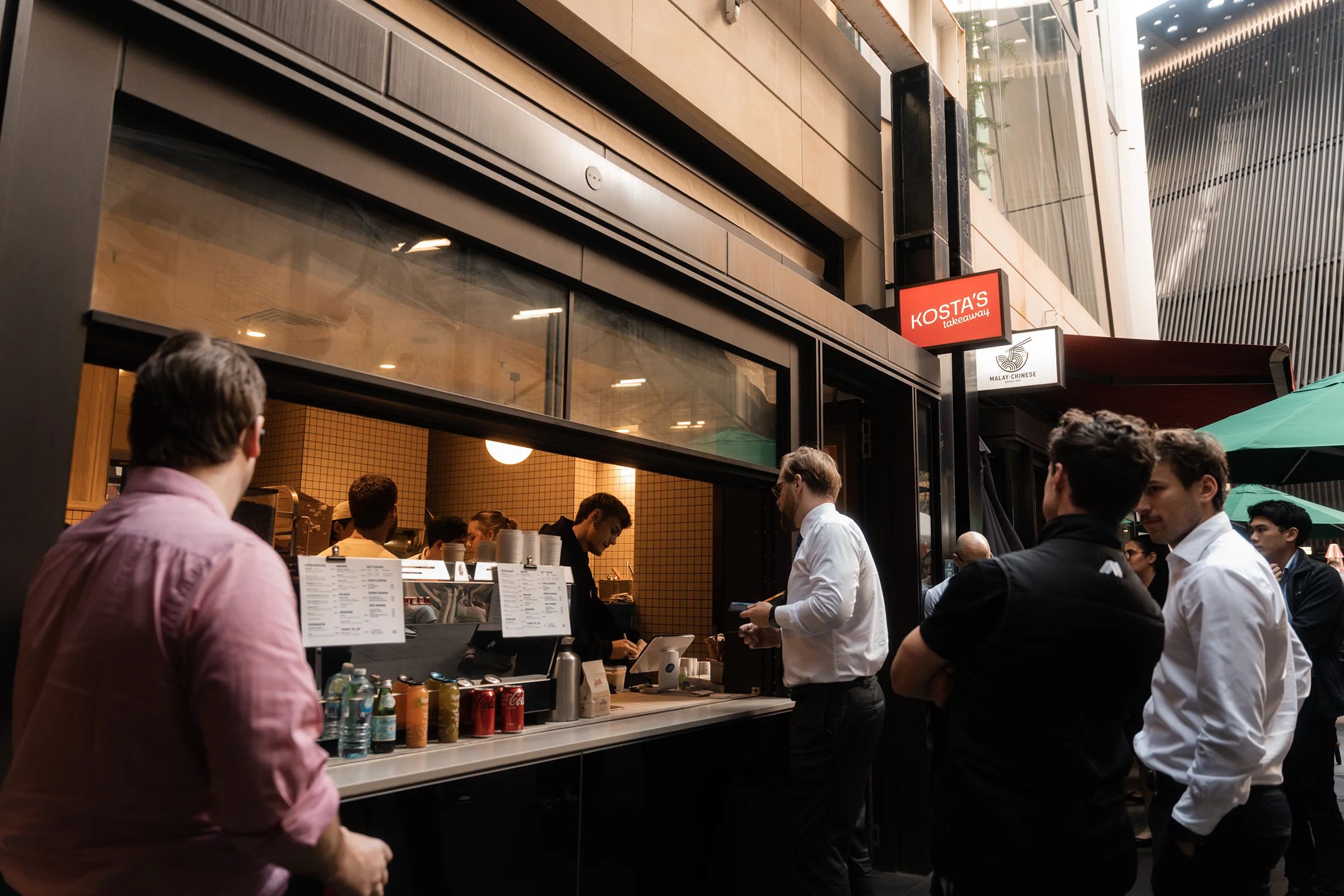
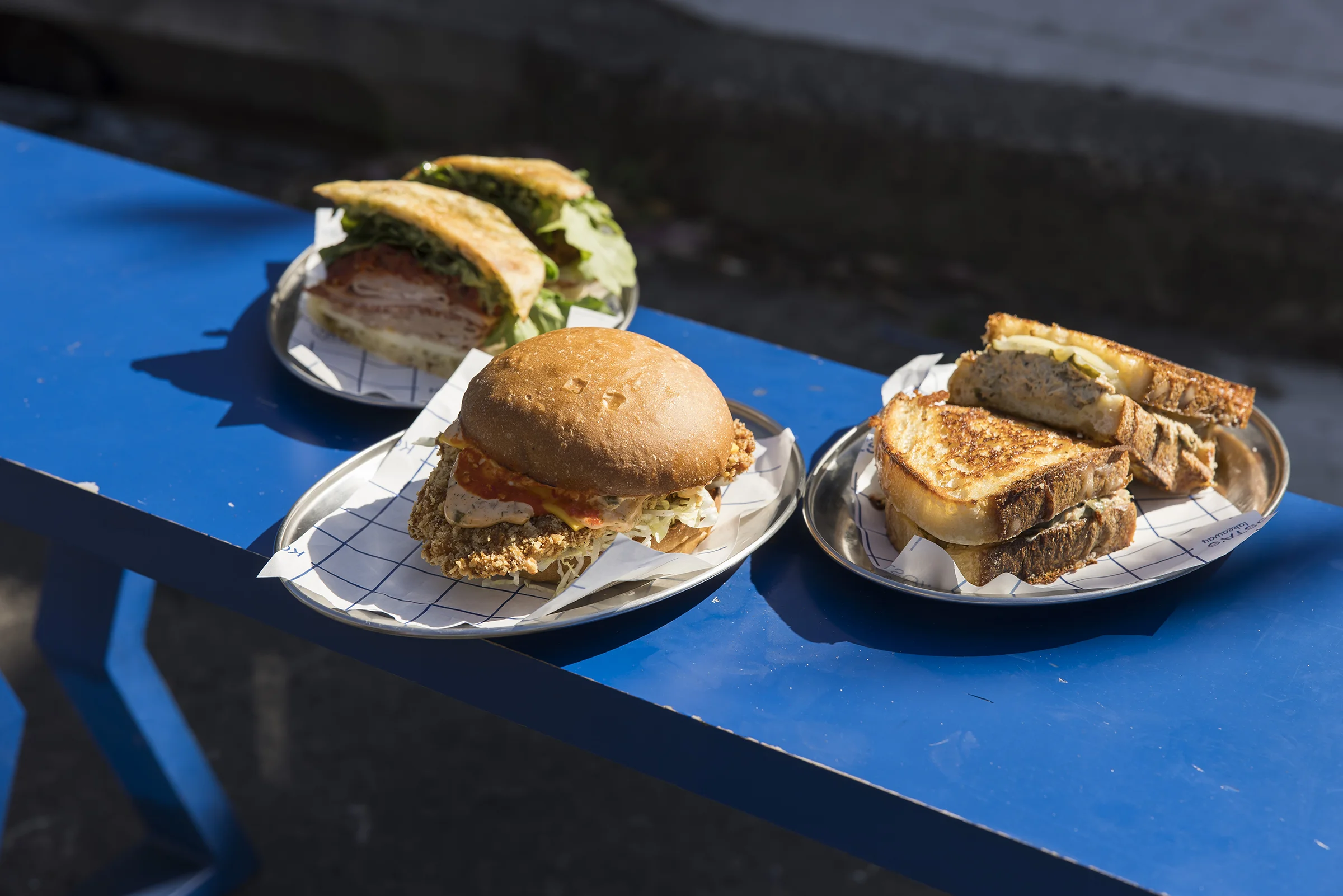
Episode Transcript
Melissa Leong:
We are proudly supported by American Express. Did you know that American Express card members can earn points when they tap on Square, and that Square sellers pay one low rate to accept the card? If you’re a Square seller, you can let your customers know that your business supports American Express payments with complimentary signage and supplies at amexpop.com/square.
Intro:
Yeah, I remember talking to the team that night, I cried. I cried in front of them.
The idea that, what we increase our prices. And then, obviously, all I think about is, “No one will come to us anymore.”
We made so many mistakes that we’re always going to make…
Don’t let Lorenzo measure the store?
A lot of them were terrified that the business fail within six months. They said that in those words, they were like, “You will not survive six months.”
And you have to try it. You have to just roll the dice. I think you have to take those risks.
Melissa Leong:
This is Coolroom Confessional, a podcast by Square. In this series, we’re offering hospo business owners a place to confess their problems. With some expert help, we’re going to try and solve them. I’m Melissa Leong. I’ve been a writer, culinary critic, and TV judge. We’ve got the young guns behind Melbourne business, Pasta Prego with us today. Let’s meet the boys.
Ask almost any Italian Australian and they’ll tell you that the heart of their childhood home was the kitchen table with a steaming bowl of pasta at its center. And if they’re anything like 25-year-old best mates, Lorenzo Fantarella and Isaac Varano, they have spent their adulthood in the pursuit of recreating.
Lorenzo Fantarella:
The nonnas are harsh critics. The best I got out of my nonna was, “Not bad.” But that means very good. I think Gordon Ramsay could cook for her and she’d still complain.
Isaac Varano:
My nonnas always like, “Oh, you worked too hard. Stop working too hard.”
Melissa Leong:
The business may be built on tradition, but the boys had a very modern start. The nonnas would recognize Isaac and Lorenzo’s carbonara, but not the viral TikTok phenomenon that launched Pasta Prego to the masses.
Social video:
Pasta Prego only opened last week, and I actually thought it was a sit-in restaurant, but this is way better. I always thought Melbourne needed a good takeaway pasta place and the universe to live it.
Lorenzo Fantarella:
Really, just a customer came in and put up a TikTok off us. I think it was, because it was organic, it worked really well. And they put up a TikTok and then it got maybe like a hundred thousand views or something.
Social video:
Check them out. Make sure you get the cheesy garlic bread.
Melissa Leong:
But this business is no flash in the pan. Pasta Prego has succeeded as a takeaway and casual dine-in pasta vendor because it’s met its moment. Post-lockdown Melbourne diners, in a cost of living crisis, want a casual food option at an affordable price point.
Lorenzo Fantarella:
We’re focused on fast casual, which is this, almost not a niche, but within, obviously it’s quick service, which is your KC’s and McDonald’s, and then there’s restaurants which are your higher-end, white tablecloth service. While we’re just sit in the middle category there.
Lorenzo Fantarella:
If an angry customer comes in and goes up to us, say, “Ah, I want to speak to the manager,” it’s like, “Ah, he’s not in today, but I’ll pass on a message.”
Melissa Leong:
It’s clear when you speak to these young men that Pasta Prego’s bottom line is the friendship they forged in primary school.
Isaac Varano:
I feel like we structure in a way where there’s not really a hierarchy. It’s just like everyone gets along really well and everyone respects each other. We hate being called the boss or the managers. We’re just workers there and people respect us and we respect them.
Melissa Leong:
The business is thriving. A year on from opening its doors in Melbourne’s Chapel Street, in South Yarra, expansion is on the co-founders’ minds.
Melissa Leong:
And with growth comes a whole lot of other challenges for any business.
Lorenzo Fantarella:
As much as we know about how a store runs, we don’t know how a franchise runs.
Melissa Leong:
Pasta Prego co-founders Lorenzo and Isaac are here. Boys, welcome to the table.
Lorenzo Fantarella:
Thank you for having us.
Isaac Varano:
Thanks for having us.
Melissa Leong:
Congratulations on being the cusp of your second storefront. Before we go into that, can you tell us a bit about how you found your first location?
Lorenzo Fantarella:
So we were looking for what, six, nine months? Really patient. Chapel Street had a bit of opportunity, post-COVID, especially. So, was just a matter of waiting for the right spot. And then, the site that we picked, I remember it came up on a Friday and I saw it of a Friday night. And Monday morning, I was on the phone with the agent and that was that. It’s just like this little food club in, I guess, the middle of Chapel Street, which can be a bit lost, I’d say.
Melissa Leong:
Right. So you thinking-
Lorenzo Fantarella:
… you’ve got the South Yarra-
Melissa Leong:
… you’re thinking about your customers, what their lives are like, where they’re going, and how you fit into their lives.
Lorenzo Fantarella:
Yeah. I guess the concept really just started from me and, both being younger, not wanting to cook every night. And it was just trying to find people like us, and then market it to them and try and fit into their daily routine.
Melissa Leong:
So we know that that has been enough of a success, that first build, that you’re moving to another location. So what are your challenges? What are the challenges that have come with that contemplation of expansion?
Isaac Varano:
I guess what we’re trying to do is literally just replicate exactly what we’ve done at another location that we feel like our target market would be. Literally just replicating it. We made so many mistakes with the first store that we’re always going to make.
Melissa Leong:
Care to share? What’s the big one?
Lorenzo Fantarella:
Don’t let Lorenzo measure the store?
Isaac Varano:
Yeah, so Lorenzo measured the first store when I was in Adelaide, and we ordered all our equipment. And then-
Lorenzo Fantarella:
Okay, there’s more backstory to this.
Isaac Varano:
Yeah.
Lorenzo Fantarella:
I’m going to get rinsed for this, but there is more backstory to this-
Isaac Varano:
Equipment rocks up, and we have everything. We’re like, “Whoa, where’s this going to fit?” Anyway, and then we have this freezer that’s right up against the corner, and it’s a four-door freezer, and only two doors open, because the two other doors are completely covered by another fridge, because someone couldn’t measure.
Lorenzo Fantarella:
We didn’t know that going into it, so that was our fault.
Melissa Leong:
So we’re moving into inviting Benji Terkalas to pull up a chair. Benji is the owner of Kosta’s Takeaway, a Sydney sandwich institution that’s about to open its fourth venue. Benji, there’re a lot of parallels between these businesses, yours and theirs. We’re looking at mainly takeaway meals, a similar price point, high-quality food that caters to professionals. Given that you’re a few steps ahead of the boys, can you tell us what you remember about that process of going from one premises to two, like Pasta Prego’s about to do?
Benjamin Terkalas:
It’s a rollercoaster, it’s a wild journey. Strap in. Biggest challenges for us was obviously very similar to you guys. Moving from one location, we had the same team, set team, everyone knew their job. Moving into the second location, not really thinking much more than, yeah, it’s just going to be the same. Open the second venue and then it’s like, “Oh, shit, we need production.” “Oh, shoot, we need to have a HR. We need to be hiring at all times.” “We need to…” It just turns into this whole different business.
You step back and you go, “Oh, I didn’t really plan for any of this. I thought we’d just open and things would just be the same.” And it was really busy. First venue’s super busy, open the second, and it’s just, we didn’t know what, were just beside ourselves working till every night, prepping, going from one venue to another, borrowing friends vans. It was, we were just doing what we needed to do to do service the next day pretty much.
Isaac Varano:
Character building?
Lorenzo Fantarella:
Yes.
Benjamin Terkalas:
Yeah, literally that’s how we call it. Brining half a ton of chicken. It was wild. It was wild. But then, obviously, we’re like, “Okay, we need to change what we’re doing, because this is not sustainable for anyone.” It was from working in the business to working on the business, which was the biggest change for us, and just setting up systems and procedures. So you go to setting up a head office team, setting up your systems and procedures to ordering. Are you guys going to have a production kitchen?
Lorenzo Fantarella:
We were planning to have it within our next door. And not initially set it up, just waiting for us to slowly pull the trigger on it. I guess that’s why we’re here mainly is to work out the best way for us to systematically set that up that’s going to get us the best bang for our buck.
Melissa Leong:
Benji and the boys have another issue to contend with, waste. When they’re designing their prep kitchen. They also have to consider the ebbs and flows of ingredients. There are some services that can help with that. Food by Us is one of them. Here’s Ben Lipschitz.
Ben Lipschitz:
What we’ve been able to do with these central kitchen concepts is we actually make the central kitchen a ghost supplier. We make them operate as a supplier on the network, but we only expose that supplier to the satellite venues. So essentially, what you’ve got is that central kitchen, through our software, can capture all the different orders that are required for that central kitchen to prep, for all of those different venues. And then, of course, the venues themselves can say, in addition to wanting X, Y, Z from the central kitchen, I also need this alcohol or this seafood or whatever, from whatever external suppliers there are.
But what that basically does is the central kitchen can set the minimum order, the central kitchen can set the cutoff time, the central kitchen can tally up all the orders that are coming from all these different venues and basically start to understand, okay, this is what I need to start getting ready and by when. And they can also communicate between one another as if one is a supplier and one is just a general restaurant.
And the benefits of that are, as you said, since they’re still finding it out and they’re still trying to understand and be flexible and fluid, you You get your data in the one space between the two sides, the central kitchen and those satellite venues really quickly, really instantly. And then, you can start to make decisions, and those decisions basically drive profit.
Benjamin Terkalas:
What will that central kitchen be mainly used for? Because one thing we found out was the more we can actually do on those… It’s got this great, “Ah, we’ve got a central kitchen, we’ll just make everything there.” But what we found out was, “Okay, let’s just work out how much we can actually do on these sites, and the less we can do in the production…” There’s certain things you want to do in the production kitchen, there’s certain things… You don’t want to pull everything out of the store, because you’ve got to organize logistics, you’ve got to pay for transport. So yeah, what kind of stuff’s going to be done at the production kitchen?
Lorenzo Fantarella:
For us, the main thing, obviously the logistics for two stores isn’t there yet, but with us, it’s mainly about quality control. Just making the sauce every day. It’s something that if we’re not doing it, the person doing it, we want to make sure to replicate and get someone to trust multiple times is really hard.
Melissa Leong:
It’s that consistency-
Lorenzo Fantarella:
If we want the….
Melissa Leong:
… that you’re looking for. Yeah.
Lorenzo Fantarella:
… So even between the two stores, the air can’t in a different spot, which will affect the flames and stuff like that, and the canopy might be stronger at one side than the other. So it’s like these little things, just some, they all add up and they just change the consistency of the sort.
Isaac Varano:
You are way more pedantic probably about your product than any other customer you would have. Do you know what I mean?
Benjamin Terkalas:
Yeah, man, it’s really hard. What youse talking about now is stepping away, because you know you can’t be at two places at once.
Isaac Varano:
Yeah.
Lorenzo Fantarella:
Yeah.
Benjamin Terkalas:
What the… What do we do? Because, yeah, you guys seem very passionate, like myself, and you’ve got these operators that are very used to treating it like a corporate setup and very business, “This is how we do it.” The hardest thing for me was actually stepping out of working in the business, because I love it-
Lorenzo Fantarella:
Yeah. I love it.
Benjamin Terkalas:
… It’s just where I felt most comfortable. I think my advice would be when you go into this second store is be the face but not from day one. Work out how it can run without you,
Lorenzo Fantarella:
Yeah.
Isaac Varano:
Yeah.
Benjamin Terkalas:
… and then the third and the fourth will become a lot easier. But if you find yourself setting it up and working in this second one, you’re in for that extra six months to it get out.
Melissa Leong:
So what the boys are telling us, and I include Benji, Kosta’s Takeaway owner in this assessment, is that they, like many business owners, are a little bit type A. okay, they’re control freaks, but believe me, I can relate. If this is you, you need to know that if you want more bricks and mortar venues, then the number of founders in your business, then you’re going to have to train your staff to replace you. That’s your job. And it’s what Alan Pessoa of Bohaus Coffee has done with his four sites. He had to check his control freak tendencies at the door or he wouldn’t be staring down the barrel of the future major expansion of his business. Here’s Alan.
Alan Pessoa:
Even though I had a plan to expand and all, I didn’t quite knew exactly what to do, so I got it going. I was going to move there myself and work there and overlook the other shop. But I did find experienced manager and he helped me a lot. When you start opening other shops, you can use more experienced people from your other cafes to bring it in. Because the boys, they’re two, it’ll be much easier for them. Because then they can send the other one there. After the second one, and I had people running one shop and I had a manager on the other one, I was already able just to come in, make sure everything was right, do a bit of customer service at peak hours and connect with the customers and the locals, and then let them do their job.
Melissa Leong:
It sounds like you’re making use of your staff across venues. Is it just automatic and easy opening a new venue now?
Alan Pessoa:
If you open a new venue and you get busy and the people are going to come in the first impression they have, they don’t actually understand that you under a lot of pressure. And even for you, if I open a new coffee shop and it’s a new Bohaus, although I know everything, you put yourself in a new venue, it’s hard. It’s good to do a soft opening, because you got to make sure whatever you’re serving is a hundred percent.
So I do, I would take one of the staff that know the menu, they’ll put them there taking orders. The most important thing is, is to keep your customers happy. Everything can be forgiven when you’re running a restaurant if you run out of something that people like. But if you know how to deal with your customers and you are close with them, they’ll get you, they’ll forgive you.
Melissa Leong:
Alan has some sound advice. Use the staff you’ve got and build on what you’re doing well in your first venue. As for the boys at Pasta Prego, they don’t need any lessons on building staff loyalty.
Benjamin Terkalas:
And that’s something with our second store I was like, “Oh, I’m not going to be able to work in here.” Saw that really quickly. In the first two, three weeks it was like, “I need to plan and exit really quickly.” Stepping away from the businesses, it’s very difficult. But you need, like you said, you need the right people in place. I think hiring just good people with the same type of culture, and understanding your level of passion and just being honest, I think, with your employees is sometimes tough. Walk away and show them that you trust them.
Lorenzo Fantarella:
Yeah. Another thing is just the way we used to train staff first, the way we train staff now, I think really has reduced the time in which they become competent and confident in their own ability. I would say we’ve really tried to make everything really visual and right in front of your face, and like, “This is how you do this, this is how you do this,” and I think they respond a lot better to that, and then just really coaching them there, every step of the way and becoming really nitpicky at these things.
And I know it is frustrating for them, because they’re like, when they’re 80% there, Lorenzo and I start to get really picky on the things that, to get them to the hundred percent. And it’s frustrating for them, but then I think when they come out the other side, they look back and they’re like, “Oh, we actually did need that,” and now, they’re fine on their own. And when they gain that extra bit of responsibility, I think they really do start to enjoy it more.
Isaac Varano:
They flourish. Yeah.
Lorenzo Fantarella:
Yeah. And you really see it come out in their personalities as well. I feel like… Obviously, it takes someone a while to warm up. And one thing Lorenzo and I do is always try and make our staff as comfortable as possible and them just to be the person they are at work. And you really see when they become more comfortable in their own work, their personality really does flourish and come out, and I think they really do then start to appreciate and love working at the workplace.
Melissa Leong:
Yeah. Benji, what do you think about that? You’re a couple of steps ahead of these guys.
Benjamin Terkalas:
They’re very passionate and the micro-managing sounds that 20%, but I get it.
Isaac Varano:
Yeah, it’s definitely that.
Melissa Leong:
These two have copped some grief over some dodgy measurements, but in a crucial way, Isaac and Lorenzo have been very smart. Instead of investing in big buys early, they’ve held back to wait and see. It means that they’re nimble enough to be responsive with the day-to-day needs until you figure out what you really need to lean on. That has meant that if they do make a mistake, it’s not hard to undo, because they haven’t committed to a two-year contract with a particular supplier of some ingredient or item that they just don’t need.
Lorenzo Fantarella:
Do you work in the business at all?
Benjamin Terkalas:
Yeah, I love to. Yeah. Whenever I have opportunities, I just feel like that’s where I learn most about the business.
Lorenzo Fantarella:
Yeah.
Benjamin Terkalas:
Got to remember you have stores and you’ve got store managers, and you’ve got the store chefs. They all protect each other.
Lorenzo Fantarella:
Yeah, perfect.
Benjamin Terkalas:
They’re a tight-knit group, so you’ve got to go in and see what’s going on. And I think you’ve got to lead from the front as well, man. You got to go in and show them that you can make pasta, you can make a sandwich, you can make coffee, you can do it all.
Lorenzo Fantarella:
You get in the trenches with them and they appreciate them more. Yeah.
Isaac Varano:
Yeah. I love doing the worst cleaning tasks just to set the precedent that none of us are above it. We are just at the same level as everyone else, so it’s just like, yep, all right, I’ll-
Melissa Leong:
Except that later on down the line, and you’ll know is that if you see the boss cleaning the range hood, there’s an issue, there’s an issue.
Isaac Varano:
The range hood’s a shocker.
Melissa Leong:
The range, cleaning of the range hood is definitely a demonstration of, “You can’t do this job. I’m going to do it.”
Isaac Varano:
Yeah. We’ve already palmed that one off.
Lorenzo Fantarella:
We palmed that one off. We got rid of that one early-
Isaac Varano:
The oily hair.
Lorenzo Fantarella:
That’s right. Nah, that’s all right, that’s all right.
Isaac Varano:
You’re standing up there and copping the hair, “No, no, I’m out.”
Melissa Leong:
This podcast is thanks to Square. Square’s magic goes beyond just taking payments. It’s your point of sale, digital tickets, online orders, and reporting all in one. If you’d like to see some more examples of businesses overcoming these and other issues, head to Square’s publication, The Bottom Line, at square.com/get/thebottomline.
Are you starting to accrue those gold employees that become part of that growth structure so far?
Lorenzo Fantarella:
Yeah.
Melissa Leong:
You keep them.
Lorenzo Fantarella:
… we’ve found a couple diamonds in the rough, I’d say.
Isaac Varano:
For sure.
Lorenzo Fantarella:
We’ve spoken about our plans with them and being very transparent. I think that’s the one thing we do really well is that we’re very transparent with our staff. With stuff like that, we don’t hide it. It’s like we want them to be part of the journey with us, especially the people who want to make it more of a career, because a lot of our staff are university students where it’s, that flexibility works for us and them being transparent and getting them on board and making sure they’re-
Melissa Leong:
Getting them emotionally involved in your business.
Lorenzo Fantarella:
… One of our manager currently, Grace, sometimes I feel like she cares more than both of us.
Isaac Varano:
One of our other potential managers as well. On his ninth day, he got a Pasto Prego tattoo-
Lorenzo Fantarella:
No way.
Isaac Varano:
… on his arm. He loves it that much.
Lorenzo Fantarella:
Yeah. And we don’t have our tatts yet.
Melissa Leong:
Does that mean free pasta for life?
Isaac Varano:
It actually does.
Lorenzo Fantarella:
That’s the agreement. So we said, “Get one the logo, I’ll give you free pasta.” He’s like “Done.”
Melissa Leong:
Now you’re going, essentially, from surviving to structuring the business with this second premises. Aside from the advice that Benji’s given so far, you mentioned, obviously, and we’ve talked about prep being super important, do you have any prep-specific questions in terms of this production kitchen versus second premises balance?
Isaac Varano:
Well, that’s a hard one, so how did you choose what you wanted to prep in your prep store? Was it… Because, obviously, what we wanted to do, we were talking about our source, making whatever centralized we can to make it as consistent as possible. How did you nitpick the things you wanted to keep on premises versus prep future?
Benjamin Terkalas:
Yeah, it’s forever evolving, because we’ll be like, “Okay, this works like this right now.” We then get better at other things and then create space to think about, “We can actually make that work there.” But picking and choosing, I think it’s, for us, the way we structure is, our group chef is in the prep kitchen. So the most important things, because it’s not very easy to find very good chefs everywhere-
Isaac Varano:
Yep.
Benjamin Terkalas:
… and with this type, style of business, you guys understand-
Isaac Varano:
Yeah.
Benjamin Terkalas:
… The most important things I think need to be done in production, because of the consistency, that person obviously, I think, would have to be the person you have most trust for, or if that is yourselves. Your key five need to be done in production, I think. There’s less room for error.
Melissa Leong:
So what does Benji mean by key five? If you’re preparing fresh meals daily, your key five are the ingredients you use most. It might be shredded cheese, diced onions. You get the idea.
Lorenzo Fantarella:
I noticed when I go to fish bowls when they run out of onion, they’ll just like pour a vacuum sealed bag, “Okay, you’re prepping that.” That’s not getting done on a store level. We’re not at that point where we’re like, oh, we can get onion sliced. Even, we have a slicer.
Melissa Leong:
Everything done pre, yeah.
Lorenzo Fantarella:
It’s like trying to find that nice balance. Like you said, the transport costs. We are not going to be driving around all day.
Benjamin Terkalas:
There’s some really good fruit and veg suppliers that offer you chopped fruit and veg, and that can actually act be, act almost like your prep kitchen. It is very expensive though.
Isaac Varano:
Yeah.
Lorenzo Fantarella:
Yeah. In terms of choosing the equipment to go in your prep kitchen, did you note down the five most important things you were going to prep there, and then get the equipment you required there in that prep kitchen?
Benjamin Terkalas:
The prep kitchen was bare shell, and we worked it out as we went. We can treat it like a restaurant. I was like, we needed this, because things just changed so quickly, because we’re like, “Oh, actually you know what? We don’t need to do this here. We can actually do that there.” So we kept it very bare minimal. We actually did it all bench-top equipment, stainless steel benches. And then, it’s taken us a couple of group chefs and a couple of the right people to come in and be like, “Okay, we now know where we’re at.” Because it’s a prep kitchen and I just didn’t want to commit to something straight away where we’re unsure and we’re still evolving?
Lorenzo Fantarella:
Yeah, I guess that makes sense because even operationally, every single day we’re so fluid. We’ll change something, I guess, minor for us, but then it makes a huge difference. Maybe every two weeks.
Isaac Varano:
Yeah, I’d say I print off all the checklists, because I’m very list=driven like, okay, everyone else have this done for pack up and I’m forever getting a permanent marker and adding to that checklist, “Oh, cross this out. Oh wait, we’re doing this now.”
Melissa Leong:
The Pasta Prego boys spend their Friday nights at work, and they wouldn’t have it any other way. They pump up the tunes and have a party as they cook. Nick Connellan, the editor of Broadsheet Australia says, star vibes are just as important for diners.
Nick Connellan:
And I think that’s a really underrated part of going to a restaurant. Is it fun? Is it a vibrant place? Is the crowd good? What I’ve seen over the years as well is that the crowd at a restaurant is often really reflective of the people who run the restaurant.
Melissa Leong:
Staff culture is one thing, staff cost is another. Here’s Alan from Bohaus again with a tip on how to reduce staff hours while maintaining the quality of your products.
Alan Pessoa:
I can give you one of the tips that I use on my business, which is keep it simple. I always search out there for people that can provide me with something they can do better than I could, if I did it on site. Because that’s going to save me a lot of time, money that I would pay for staff to get it done for me, and make your life a lot easier.
Melissa Leong:
Yeah, I think that’s a really smart way to do it. If you can’t do everything from scratch at the beginning, being smart about making those choices and then layering your brand, in your IP, over the top of that to create something that is still your own thing at the end of the end of the day is a very cool way to go about it.
Isaac Varano:
Exactly right. Like Lorenzo said, yeah, you can’t really replicate that, so someone else’s Italian pork and fennel sausage is going to be different to ours, because we have our recipe that works for us.
Lorenzo Fantarella:
Thank you to the Varano family, that my family did not contribute to that one. Thanks guys.
Isaac Varano:
That was my nonna’s, my dad’s dad’s recipe-
Melissa Leong:
Yeah.
Isaac Varano:
… which he loves.
Lorenzo Fantarella:
I was also going to ask Benji, sorry to pull back on the other question before. With the prep kitchen that you guys have, is that also a storefront or that’s like a pure ghost kitchen?
Benjamin Terkalas:
Yeah, good question. That was something we took time on and we didn’t, that’s why we made work where we were for a while, but I just saw value in having a storefront with a prep kitchen at the back.
Lorenzo Fantarella:
Yeah, cool.
Benjamin Terkalas:
Because then it slows down my travel time. So we got head office production and a storefront. I think it’s cool to have a little HQ. and that’s where you guys… The HQ is based, why not have a storefront? But I just think it’s cool having something where HQ is.
Melissa Leong:
Now, with this upcoming second shop, you’re potentially looking at repeating some of the teething issues that you had with your first shop. When you’re thinking about that, what were some of those initial big problems, and are any problems still unresolved in your business?
Lorenzo Fantarella:
There definitely are. I think we are adapt-or-die people, so we’re always going to have problems. We know that and we are always going to be trying to solve them, and then a new problem will come up. I feel like we get one problem solved and we gain two new ones, so it’s normal business for everyone, I guess. I think for us it’s just getting the right staff back in and stuff like that, getting the culture right again and making sure that translates between the two stores. So we’re already training staff up, so when they do translate across to the new store, it will be a smoother transition. It won’t be perfect, we’re well aware of that, but they’ll make it a lot easier for us.
Benjamin Terkalas:
See you guys soon, in a moment for sure.
Isaac Varano:
It’d be great to chat as well.
Benjamin Terkalas:
Definitely. 100%.
Lorenzo Fantarella:
Benji, I got to ask, with the beard, how long did that take?
Benjamin Terkalas:
How long did it take?
Lorenzo Fantarella:
Yeah, because I’m 25, and this is 25 years.
Melissa Leong:
Yeah.
Lorenzo Fantarella:
Everyone can see.
Benjamin Terkalas:
Hey, I’m going to send you a photo. I think… I didn’t start getting a beard till I was 22, 23. I’m not sure.
Lorenzo Fantarella:
Thank you, man. Appreciate it.
Benjamin Terkalas:
No, good luck, guys. All the best.
Lorenzo Fantarella:
Thank you, man. You too.
Melissa Leong:
Thanks, Benji.
Isaac Varano:
Take care.
Lorenzo Fantarella:
See you later.
Melissa Leong:
Lorenzo and Isaac, what’s the first thing you’re going to do after this chat?
Isaac Varano:
We’ve got a catering order-
Lorenzo Fantarella:
Got a catering order.
Isaac Varano:
… that we have to get out.
Lorenzo Fantarella:
We going to run and shopping.
Isaac Varano:
We’re get in the car and chat and say how much that great experience was to get to know you and the other guys, and how much we really got out of it.
Melissa Leong:
Amazing. Well look, it’s been a pleasure chatting to you at this stage in your business. You have such a bright future ahead of you. I can’t wait to see what you do.
Lorenzo Fantarella:
Awesome.
Isaac Varano:
Thank you so much.
Lorenzo Fantarella:
Thank you so much.
Melissa Leong:
Coming up next on Coolroom Confessional.
Christopher Norris:
True. It is a bit daunting like opening two at once. I think I’m going to be all right. Ask me again in 10 weeks we open the sandwich shop.
Joe Vargetto:
One statement you said, “I think we’re going to be all right,” worries me.
Melissa Leong:
This podcast is thanks to Square. Hospitality has enough on their plate. Square builds business tools that help hospo businesses like yours run smoothly. It’s more than just payments, from table layouts to a digital ticketing system for your kitchen, it’s all integrated and it all talks to each other, because service still matters. Find out more at square.com/my/coolroom.
We are proudly supported by American Express. Did you know that Square sellers automatically accept American Express for the same low rate as all other cards. Let American Express card members know that you support their payment method of choice with Square. Get your complimentary signage and supplies at amexpop.com/square to help you attract more customers.
Catering order up-
Isaac Varano:
Awesome.
Lorenzo Fantarella:
Thank you.
Melissa Leong:
How big’s the catering order?
Isaac Varano:
Ah, just 40. We did 140 yesterday, so that was a bit of a…
Lorenzo Fantarella:
Yeah, definite early start that one. But it’s fine.
Melissa Leong:
A bit surprised.
![]()




